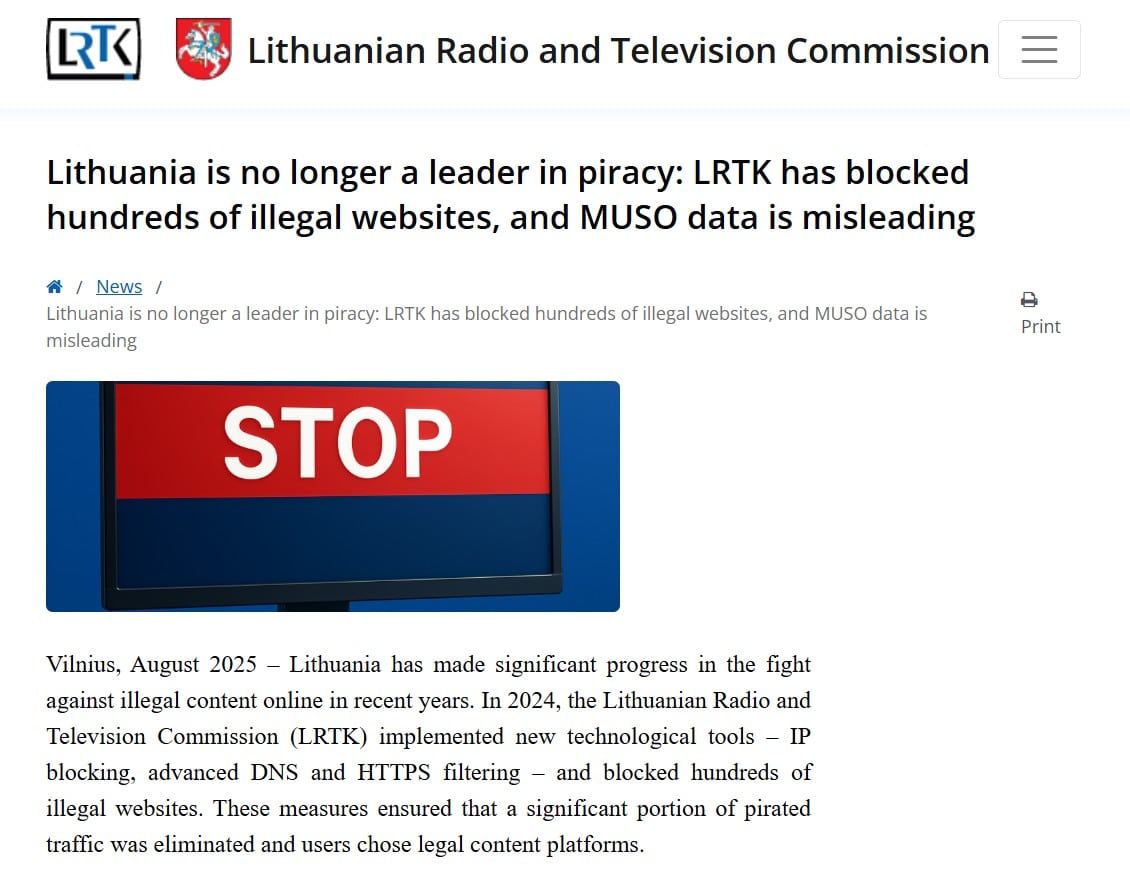 Late last year, the European Union Intellectual Property Office released its latest copyright infringement monitor report.
Late last year, the European Union Intellectual Property Office released its latest copyright infringement monitor report.
The research is part of a recurring series that has tracked European piracy rates since 2017. Among other things, the data helps to shape future policy decisions.
The report draws on data provided by UK-based piracy monitoring company MUSO. The data is largely based on web-based visits to pirate sites and doesn’t count views or downloads for this purpose. That said, it’s generally seen as a decent proxy for pirate interest.
As in previous years, Lithuania was listed as one of the countries with a relatively high number of visits to pirate sites per user, more than double the EU average. This isn’t a major surprise, as piracy rates in Eastern Europe have always been high. However, the Lithuanian authorities believe this doesn’t reflect the reality on the ground.
Lithuania: We’re No Piracy Haven
Earlier this week, the Lithuanian Radio and Television Commission (LRTK) published an article highlighting its achievements on the anti-piracy front. It notes that hundreds of sites were blocked in 2024 to prevent access to copyrighted content.
The authorities also enabled more advanced methods, including advanced DNS and HTTPS blocking. With these measures in place, LRTK is confident that a significant part of all traffic to piracy sites has been eliminated, motivating more people to sign up with legal streaming platforms.
These enforcement updates are not just to show the country’s reported progress on the anti-piracy front; the government body specifically wants to counter the impression that Lithuania is a piracy haven.
“Lithuania is consistently implementing effective measures to fight against piracy. In recent years, the blocked websites have covered a significant portion of illegal traffic. Claims that Lithuania is a leader in piracy no longer reflect reality today,” says Mantas Martišius, LRTK’s Chairman.
Dated Piracy Data
The regulatory body is undeniably taking action in response to piracy. Measuring the effectiveness of these measures isn’t straightforward, but it’s clear that LRTK is frustrated by the suggestion that online piracy is (still) rampant in the country.
LRTK says that public discussions continue to cite MUSO data from 2021, which ranked Lithuania fifth (*note) in the EU when considering piracy rate per user.

According to LRTK, current policy discussions should not be based on old data, since the situation in Lithuania has changed dramatically. Enforcement has picked up in the country and while MUSO data can be useful, it is not flawless, LRTK says.
“MUSO data can be useful for seeing the global picture, but it is not accurate enough to assess individual countries. Especially relatively small markets like Lithuania,” LRTK’s chairman says.
“Misleading” Data Discussed at EUIPO
The regulatory body goes a step further by calling the data misleading. It points out several issues and problems, including retrospective data updates, the exclusion of non-web-based piracy, and the lack of a clear definition of what constitutes a pirate site.
LRTK also notes that the sample of pirate sites includes legitimate websites. When we asked for more details, a spokesperson mentioned the official South Park URL, southparkstudios.com, as an example of a site that’s inaccurately listed as a pirate resource.
LRTK’s Key Criticisms of MUSO’s Methodology
-
✗
Inclusion of Legal Sites: Data includes legitimate websites (e.g., southparkstudios.com) that are not classified as illegal, leading to inflated piracy stats. -
✗
Exclusion of Key Pirate Sources: The methodology fails to track traffic from sites using only IP addresses and private, subscription-based IPTV/VOD services, thus missing a large portion of actual piracy. -
✗
VPN Data Blindspot: MUSO cannot accurately identify the country of users accessing sites via VPN, making country-specific data unreliable. -
✗
Lack of Clear Criteria: There are no transparent standards for how a website is classified as “pirated” on the platform. -
✗
Retrospective Data Changes: Past piracy data is arbitrarily changed when collection methods are updated, making historical trends and comparisons unreliable.
LRTK takes these concerns seriously. It recently presented comments on MUSO methodology at the European Union Intellectual Property Office (EUIPO), where the reliability of this type of data for EU-wide policy is currently being discussed.
MUSO: LRTK is Misleading
MUSO is not happy with these comments and the associated allegations. The piracy tracking company tells us that they were not informed about these concerns before they were publicly shared by LRTK.
“The statements they made are misleading, and we are requesting that LRTK amend their comments,” MUSO says.
MUSO did not respond to the issues in detail, except for mentioning that a previous data adjustment was linked to a third-party data problem that has been resolved.
What is clear, however, is that MUSO’s data isn’t comprehensive. It doesn’t measure IPTV use, for example, as it only counts website visits. In addition, VPN usage can cloud reporting if it’s not filtered out. If and how that impacts Lithuania’s piracy rank is anyone’s guess.
While MUSO maintains that the regulator’s claims are ‘misleading,’ LRTK is convinced that its enforcement actions have changed the landscape. Without providing alternative data, the commission believes the country is no longer a frontrunner when it comes to online piracy.
“Lithuania is no longer the leader in piracy. The actions of the LRTK in recent years – hundreds of blocked websites, IP addresses and the implementation of advanced blocking tools – have significantly reduced the scale of illegal content,” LRTK’s statement concludes.
Ranked fifth in the EU?:
The LRTK’s specific claim that Lithuania was ranked fifth in the EU based on 2021 MUSO data is difficult to source from a final EUIPO publication. The statement likely conflates several high rankings from that period.
For example, a 2024 report from Lithuania’s Ministry of Culture references two key statistics for the year 2021: one from an EUIPO survey that placed the country third in the EU, and separate MUSO data that ranked it fifth overall.
While that data is a few years old, the most recent EUIPO report—published in November 2024—shows the trend has continued. This latest report, which contains data for 2023, places Lithuania among the top four countries with the highest overall piracy rates.
These high rankings come in addition to the Lithuanian ministry’s own survey, which found that 40% of the population had consumed pirated content in the past year.
From: TF, for the latest news on copyright battles, piracy and more.
Powered by WPeMatico
